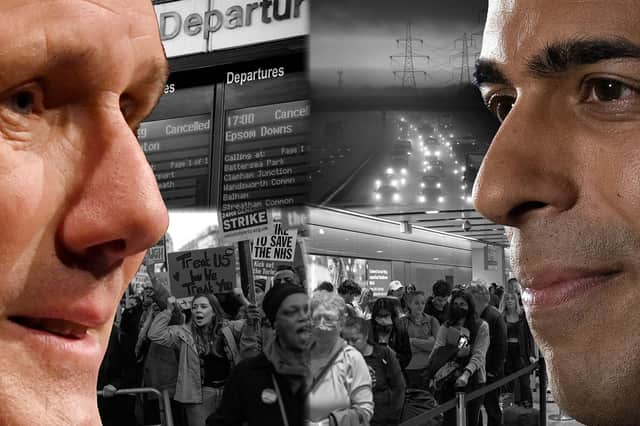Broken Britain can only be fixed by upsetting and unseating the establishment


A variety of media commentators and celebrities regularly give the impression that the UK has descended into a malady of work shyness and racism. This merely proves the point that those influencers are out of touch with what is happening in the real world.
All over the country in the regions represented by the NationalWorld media group there are examples of hard working citizens seeking to rebuild their communities after the pandemic. The stories in local papers that attract most attention and audience are about town centre rejuvenation, local business start-ups and particularly schools - pointing to an aspirational society with people from all ethnicities working together.
Advertisement
Hide AdAdvertisement
Hide AdBritain has an unyielding culture of public spiritedness and tolerance belied by the constant sniping. This noble culture is manifested in another way - the all too tolerant acceptance of poor service and disruption.
It is not just the NHS and trains feeling the strains - it is the long-suffering motorists on clogged, dysfunctional roads, the airline passengers, the customers of the utility companies and the unaffordable energy costs, those who lack efficient broadband services and parents seeking adequate schools.
Everyone has their own story but the universal refrain is - ‘nothing works.’
Our democratic system is often excused for its imperfections on the basis that it is better than dictatorship. Nevertheless the current and flawed first past the post two-party system puts immense power into the hands of the government and in particular the Prime Minister. That power has all too often been trusted to those who have made every mess a bigger one. In the face of this abuse the public is losing confidence and that will not be restored by replacing one set of dogma for another in an election.
Advertisement
Hide AdAdvertisement
Hide AdFor example, leadership can no longer be about determining party principles as to whether or not to talk to the trade unions - it should be solely about restructuring all the components of the railways to provide reliable service. 2023 needs to be the year that government begins to deliver better service based on the public need and not on party principles.
The starting point is to admit the deep flaws in treasured institutions, starting with the dismantling of centralised control and maximising devolution to the regions and nations. A more federalist system, putting real power in local hands, is perhaps also the best way to preserve the union.
In place of the House of Lords we could have a House of Representatives made up of elected delegates from the democratic institutions of the regions and nations while membership of the House of Commons is slimmed down to deal with the aforementioned and compacted national agenda.
The defence of the NHS in its present form is the cowardly refuge of politicians of all shades frightened of offending voters with something other than the orthodoxy. Government needs to confront the need to reorganise a bureaucratic and technology poor institution bloated with middle management; and above all reform the financing of the health and care service so that those who can afford it can pay more and the employed young are assisted in financially planning to provide for their fading years.
Advertisement
Hide AdAdvertisement
Hide AdImaginative, far reaching reforms are required to overhaul pensions, transport, inefficient policing, unfair rewards for the few, red tape that squashes enterprise and the removal of disincentives to find employment. All of these needs, including NHS reform, are known by all parties but none appears to be prepared to publicly acknowledge that the current model is bust - let alone provide a coherent remedy.
While declaring an interest - and citing an example on a more minor scale - the great British establishment’s insistence on clinging to decaying institutions is illustrated by the BBC. Setting aside the undemocratic, Soviet-style practice of taxing citizens to pay for content they do not necessarily want, the BBC is a classic case of justifying its existence as if the world has stood still for 50 years. The arguments to protect its threadbare service that it is the creative showcase for Britain and it provides ‘universality’ and ‘impartiality’ are exposed daily as nonsensical in the era of Netflix, Disney Plus and multiple 24-hour news channels.
Much more important services are in the same chronic condition as the BBC, and apparently just as unaccountable. This is government’s fault and it has reached crisis point.
Rishi Sunak is a banker and Keir Starmer is a lawyer - in the corporate world these professionals are known, in all seriousness, as ‘advisors.’ The general feeling in the business community is that such advisors are very smart but you would not let them run a bath.
Advertisement
Hide AdAdvertisement
Hide AdThe two may now be taking turns to be Prime Minister but the public care less and less about blue or red, capitalism or socialism. What they want is leadership that starts to manage the services to make lives more liveable and to solve the cost of living crisis to make life more affordable.
Rishi has first go - can he come out from under his spreadsheet to discover the real world and find managers to radically restructure all the UK services and key suppliers? If not, Keir will have exactly the same challenge.
Neither can succeed if they are looking over their shoulder and hoping for the blessing of their party hacks. Fixing broken Britain in the coming year and beyond can only be achieved by upsetting - and ultimately unseating - the British political establishment.
David Montgomery is executive chairman of this title’s parent company, NationalWorld plc
Comment Guidelines
National World encourages reader discussion on our stories. User feedback, insights and back-and-forth exchanges add a rich layer of context to reporting. Please review our Community Guidelines before commenting.